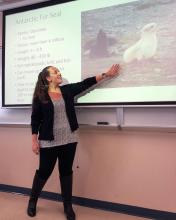The polar regions are critically important in maintaining the earth’s climate, yet the public is not well versed on facts about them. A polar science curriculum for 9th-12th grade students was developed to address this issue. Freshmen at UNCW were used as a proxy to determine if a polar science curriculum is needed in a high school setting. Participants were surveyed using a short questionnaire with their knowledge of these regions determined using a series of pre- and post-tests. A majority of the participants were exposed to information about the polar regions during their time in high school; however, they were uncomfortable answering questions about them. There was a significant difference between the pre- and post-test scores for participants who were exposed to the curriculum, but no difference among the control groups. Based on these results, the curriculum would be successful and beneficial in a high school setting.
I would like to thank the College of Arts and Sciences for awarding me with their Undergraduate Research and Creativity Award.
I contacted Dr. Emslie during the Fall 2017 semester, as I was interested in doing work in science education and he had previous experience creating educational tools regarding the polar regions. I hoped to improve my research skills and gain experience working in human subjects research, as well as gain experience creating educational programs and working with students in the classroom.
I gained an immense amount of experience over the last three semesters. I utilized a variety of skills that I have developed during my time at UNCW to complete my honors project. These skills include, but are not limited to, critical thinking, research using peer-reviewed sources, scientific writing, and using the scientific method. Over the course of my project, I also developed and used new skills such as lesson planning, creating visual aids, and performing human subjects research by following UNCW’s Institutional Review Board’s standards. I was also able to present a few of my lessons as outreach at South Brunswick High School, which improved my public speaking skills and allowed me to become more confident in the classroom.
My honors project was beneficial in reaffirming my chosen career path as a secondary science educator. Over the last three semesters, I learned how to write lesson plans that support student-centered learning, how to create engaging presentations, and how to develop strategies to test student knowledge. I also learned additional skills that I will take with me into my future career and into graduate school. This summer, I will begin a master’s program that will prepare me even further for my future career and because of my honors project, I believe that I am well prepared to begin this program and may have an advantage considering the experiences that I have had in the classroom thus far.





